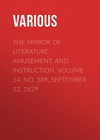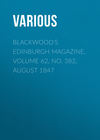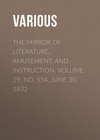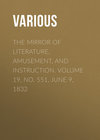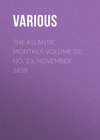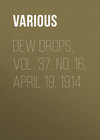Loe raamatut: «The Mirror of Literature, Amusement, and Instruction. Volume 14, No. 389, September 12, 1829», lehekülg 5
Mr. Opie now happened to glance towards the stage box, surprise! doubt! anger! certainty! were the alternate expressions of his pale face, and widely opened eyes; and at length pointing to Dumps he exclaimed—
"Ladies and gentlemen, it is my painful duty to inform you that Mr. Liston is now before you; there he sits at the back of the stage box, and I trust I may be permitted to call upon him for an explanation of his very singular conduct."
Every eye turned towards Dumps, every voice was uplifted against him; the man who could not endure the scrutiny of one pair of eyes, now beheld a house full of them glaring at him with angry indignation. His head became confused, he had a slight consciousness of being elbowed through the lobby, of a riot in the crowded street, and of being protected by the civil authorities against the uncivil attacks of the populace. He was conveyed to bed, and awoke the next morning with a very considerable accession of nervous malady.
He soon heard that the whole town vowed vengeance against the infamous and unprincipled impostor who had so impudently played off a practical joke on the public, and at dead of night did he escape from the town of Tewksbury, in a return mourning coach, with which he was accommodated by his tender hearted landlady.
Our persecuted hero next occupied private apartments at a boarding-house at Malvern. Privacy was refreshing, but, alas! its duration was doomed to be short. A young officer who had witnessed the embarrassment of "the stranger" at Tewksbury, recognised the sufferer at Malvern, and knowing his nervous antipathy to being noticed, he wickedly resolved to make him the lion of the place.
He dined at the public table, spoke of the gentleman who occupied the private apartments, wondered that no one appeared to be aware who he was, and then in confidence informed the assembled party that the recluse was the celebrated author of the "Pleasures of Memory," now engaged in illustrating "HIS ITALY" with splendid embellishments from the pencils of Stothard and Turner.
Dumps again found himself an object of universal curiosity, every body became officiously attentive to him, he was waylaid in his walks, and intentionally intruded upon by accident in his private apartments; a travelling artist requested to be permitted to take his portrait for the exhibition, a lady requested him to peruse her manuscript romance and to give his unbiassed opinion, and the master of the boarding-house waited upon him by desire of his guests to request that he would honour the public table with his company. Several ladies solicited his autograph for their albums, and several gentlemen called a meeting of the inhabitants, and resolved to give him a public dinner; a craniologist requested to be permitted to take a cast of his head, and as a climax to his misery, when he was sitting in his bedchamber thinking himself at least secure for the present, the door being bolted; he looked towards the Malvern Hills, which rise abruptly immediately at the back of the boarding-house, and there he discovered a party of ladies eagerly gazing at him with long telescopes through the open windows!
He left Malvern the next morning, and went to a secluded village on the Welsh coast, not far from Swansea.
The events of the last few weeks had rendered poor Sighmon Dumps more sensitively nervous than ever. His seclusion became perpetual, his blind always down, and he took his solitary walks in the dusk of the evening. He had been told that sea sickness was sometimes beneficial in cases resembling his own; he, therefore, bargained with some boatmen, who engaged to take him out into the channel, on a little experimental medicinal trip. At a very early hour in the morning he went down to the beach, and prepared to embark. He had observed two persons who appeared to be watching him, he felt certain they were dogging him, and just as he was stepping into the boat they seized him, saying, "Sir, we know you to be the great defaulter who has been so long concealed on this coast; we know you are trying to escape to America, but you must come with us."
Sighmon's heart was broken. He felt it would be useless to endeavour to explain or to expostulate; he spoke not, but was passively hurried to a carriage in which he was borne to the metropolis as fast as four horses could carry him, without rest or refreshment. Of course, after a minute examination, he was declared innocent, and was released; but justice smiled too late, the bloom of Sighmon's happiness had been prematurely nipped.
He called in the aid of the first medical advice, grew a little better; and when the doctor left him he prescribed a medicine which he said he had no doubt would restore the patient to health. The medicine came, the bottle was shaken, the contents taken—Sighmon died!
It was afterwards discovered that a mistake had occasioned his premature departure; a healing liquid had been prescribed for him, but the careless dispenser of the medicine had dispensed with caution on the occasion, and Dumps died of a severe oxalic acidity of the stomach! By his own desire he was interred in the churchyard opposite to Burying Ground Buildings, Paddington Road. His funeral was conducted with almost as much decorum as if his late father the mute had been present, and he was left with—
"At his head a green grass turf,
And at his heels a stone."
But even there he could not rest! The next morning it was discovered that the body of Sighmon Dumps had been stolen by resurrection men!—Sharpe's Mag.
SPIRIT OF THE PUBLIC JOURNALS
MARIA GRAY.—A SONG
BY THE ETTRICK SHEPHERD
Who says that Maria Gray is dead,
And that I in this world can see her never?
Who says she is laid in her cold death-bed,
The prey of the grave and of death for ever?
Ah! they know little of my dear maid,
Or kindness of her spirit's giver!
For every night she is by my side,
By the morning bower, or the moonlight river.
Maria was bonny when she was here,
When flesh and blood was her mortal dwelling;
Her smile was sweet, and her mind was clear,
And her form all human forms excelling.
But O! if they saw Maria now,
With her looks of pathos and of feeling,
They would see a cherub's radiant brow,
To ravish'd mortal eyes unveiling.
The rose is the fairest of earthly flowers—
It is all of beauty and of sweetness—
So my dear maid, in the heavenly bowers,
Excels in beauty and in meetness.
She has kiss'd my cheek, she has komb'd my hair,
And made a breast of heaven my pillow,
And promised her God to take me there,
Before the leaf falls from the willow.
Farewell, ye homes of living men!
I have no relish for your pleasures—
In the human face I nothing ken
That with my spirit's yearning measures.
I long for onward bliss to be,
A day of joy, a brighter morrow;
And from this bondage to be free,
Farewell thou world of sin and sorrow!
Blackwood's Magazine.
BEWICK, THE ENGRAVER
By a Correspondent of the Magazine of Natural History
Bewick's first tendency to drawing was noticed by his chalking the floors and grave-stones with all manner of fantastic figures, and by sketching the outline of any known character of the village, dogs, or horses, which were instantly recognised as faithful portraits. The halfpence he got were always laid out in chalk or coarse pencils; with which, when taken to church, he scrawled over the ledges of the bench ludicrous caricatures of the parson, clerk, and the more prominent of the congregation. These boards are now in the possession of the Duke of Northumberland, by whom they were replaced; and when his chalk was exhausted, he resorted to a pin or a nail as a substitute. In consequence of this propensity to drawing, some liberal people, of whom he says, there were many in Newcastle, got him bound apprentice to a Mr. Bielby, an engraver on copper and brass. During this period he walked most Sundays to Ovingham (ten miles,) to see his parents; and, if the Tyne was low, crossed it on stilts; but, if high-flowing, hollaed across to inquire their health, and returned. This infant genius (but it was the infant Hercules struggling with the snakes) was bound down by his master to cut clock-faces and door-knockers—ay, clock-faces and door-knockers!—and he actually showed me several in the streets of Newcastle he had cut. At this time he was employed by Bielby to cut on wood the blocks for Dr. Hutton's great work on Mensuration. Hutton was then a schoolmaster at Newcastle (1770.)
After his apprenticeship, he worked a short time for a person in Hatton Garden; but he disliked London extremely, still panting for his native home, to whose braes and bonny banks he joyously returned; where he was occupied in cutting figures and ornaments for books; and now received his first prize from the Society of Arts for the "Old Hound," in an edition of Gay's Fables. A glance at this cut will show what a low state wood-engraving was at, when a public society deemed it worthy a reward; yet even in this are readily visible some lines and touches of the future great master of this delicious art. He never omitted visiting itinerant caravans of animals, from whose living looks and attitudes he made spirited drawings. This led to his History of Quadrupeds, 1790; the first block, however, of which, he cut the very day of his father's death, Nov. 15, 1785. From this work he obtained very considerable celebrity; which led him shortly to draw and engrave the wild bull at Chillingham, Lord Tankerville's, the largest of all his wood-cuts, impressions of which have actually been sold at twenty guineas each; and also the zebra, elephant, lion, and tiger, for Pidcock (Exeter 'Change,) copies whereof are now extremely scarce and valuable. He also executed some curious works on copper, to illustrate a Tour through Lapland, by Matthew Consett, Esq.; and his Quadrupeds having passed through seven editions, his fame was widely and well established. The famous typographer, Bulmer, of the Shakspeare Press (a native of Newcastle,) now employed John Bewick, who, at the age of fourteen, had also been aprenticed to Bielby, in co-operation with his brother Thomas, to embellish a splendid edition of Goldsmith's Deserted Village and Hermit, Parnell's Poems, and Somerville's Chase. The designs and execution of these were so admirable and ingenious, that the late king, George III. doubted their being worked on wood, and requested a sight of the blocks, at which he was equally delighted and astonished. It is deeply to be lamented we have so few specimens of the talents of John Bewick, who died of a pulmonary complaint, 1795, at the early age of thirty-five.
I now, in this hasty, feeble, and divaricated biographical sketch, approach the great and favourite work of my admired friend, The History of British Birds. The first volume of this all-delighting work was published in 1797, jointly by Bielby and Bewick, but was afterwards continued by Bewick. This beautiful, accurate, animated, and (I may really add) wonderful production, having passed through six editions, each of very numerous impressions, is now universally known and admired.
The first time I had personal interview with my venerable friend was at Newcastle upon Tyne, on Wednesday, October 1, 1823, after perambulating the romantic regions of Cumberland and Westmoreland, with my friend, John E. Bowman, Esq., F.L.S. We had been told that he retired from his workbench on evenings to the "Blue Bell on the side," for the purpose of reading the news. To this place we repaired, and readily found ourselves in the presence of the great man. For my part, so warm was my enthusiasm, that I could have rushed into his arms, as into those of a parent or benefactor. He was sitting by the fire in a large elbow-chair, smoking. He received us most kindly, and in a very few minutes we felt as old friends. He appeared a large, athletic man, then in his seventy-first year, with thick, bushy, black hair, retaining his sight so completely as to read aloud rapidly the smallest type of a newspaper. He was dressed in very plain, brown clothes, but of good quality, with large flaps to his waistcoat, grey woollen stockings, and large buckles. In his under-lip he had a prodigious large quid of tobacco, and he leaned on a very thick oaken cudgel, which, I afterwards learned, he cut in the woods of Hawthornden. His broad, bright, and benevolent countenance at one glance, bespoke powerful intellect and unbounded good-will, with a very visible sparkle of merry wit. The discourse at first turned on politics (for the paper was in his hand,) on which he at once openly avowed himself a warm whig, but clearly without the slightest wish to provoke opposition. I at length succeeded in turning the conversation into the fields of natural history, but not till after he had scattered forth a profusion of the most humorous anecdotes, that would baffle the most retentive memory to enumerate, and defy the most witty to depict. I succeeded by mentioning an error in one of his works; for which, when I had convinced him, he thanked me, and took the path in conversation we wished. In many instances, I must remark, though frequently succeeding to the broadest humour, his countenance and conversation assumed the emitted flashes and features of absolutely the highest sublimity; indeed, to an excitement of awful amazement, particularly when speaking on the works of the Deity.
